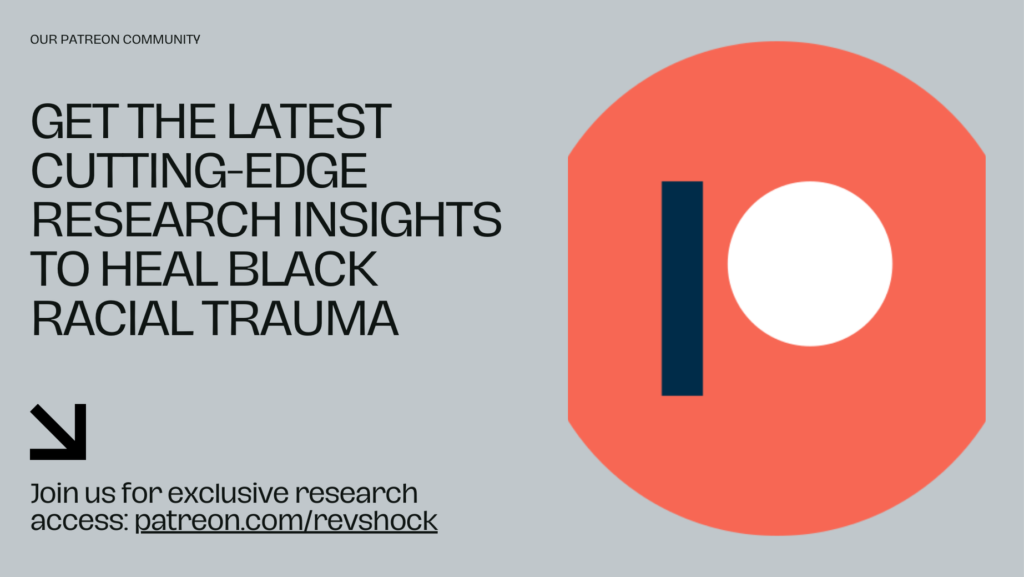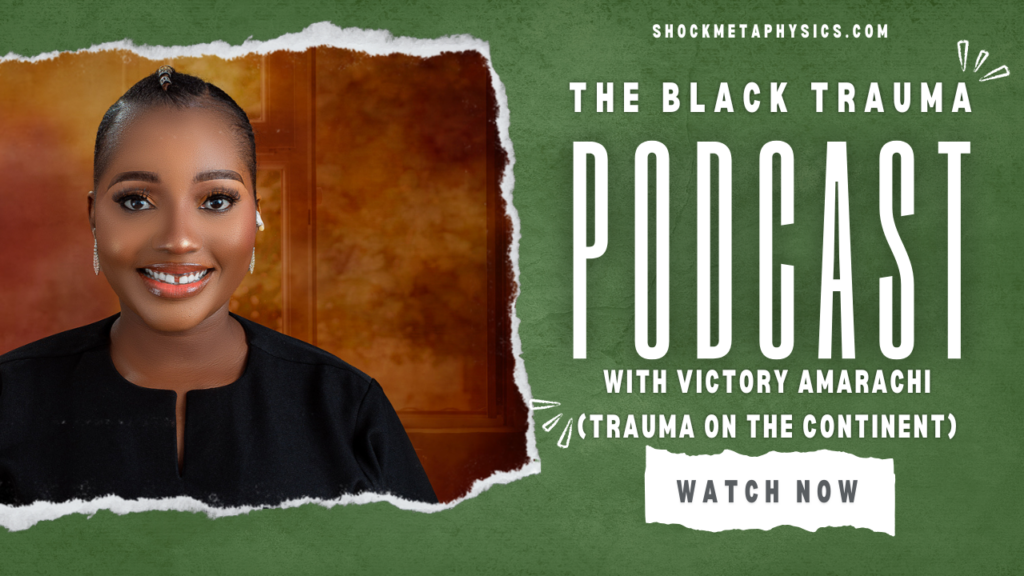
Powered By BlackTraumaGPT.com
Researched and Curated By Rev. Dr. Philippe SHOCK Matthews – https://solo.to/revshock | https://linktr.ee/revshock (Black Trauma and Mental Health Specialist | Prompt Eng | GPT Dev | Research Scientist | Africana Phenomenologist | Black Mental Health Podcast Host | FREE Webinar)
In this powerful conversation from the Black Trauma Podcast, host Rev. Dr. Philippe SHOCK Matthews sits down with Nigerian author, electrical engineer, and thought leader Victory Amarachi to discuss the roots and manifestations of trauma among Africans, particularly in Nigeria. Victory has authored over ten books exploring African identity, religion’s impact on the continent, and pathways toward healing and empowerment.
Introduction
Dr. Matthews: Victory Amarachi is a true juggernaut in Africa—a native of Imo State, Nigeria whose academic journey led her to electrical engineering, showcasing her analytical and problem-solving skills. However, her passions extend far beyond engineering. Victory’s literary prowess is evident in her authorship of over ten books through which she seeks to ignite a spark in the minds of Africans, encouraging them to think critically, dream big, and strive for greatness. Her books cover self-improvement, motivation, leadership, and personal development. A lifelong learner, Victory enjoys reading and expanding her knowledge while cherishing opportunities to interact with like-minded individuals who share her passion for personal and societal growth. She also has natural public speaking talent, with her voice inspiring millions around the globe.
Understanding Trauma in the African Context
Dr. Matthews: Let’s get into it. When we first met, when I first found your work, it was about “Awakening the Giant in Africa,” and I just loved it. I wrote a book review on it and published it on Academia.edu as pivotal work and required reading. Today, I want to build upon that. Talk to me about what you understand about racial trauma, black trauma.
Victory: Let me start by defining trauma. Trauma is a psychological or emotional response to an event in one’s life. In a layman’s understanding, trauma is a deep wound or shock that results from events in one’s life—events like war, discrimination, injuries, and accidents.
I can describe trauma using an electrical analogy: it’s like what happens to a man who is just brought out from electrocution. The world at that very moment will be spinning around him, and the shock from that electrocution is what we would call trauma. Trauma can result from many things, including discrimination and various other factors that trigger this trauma.
Religion as a Source of Trauma
Dr. Matthews: Let’s talk about the elephant in the room: religion as a trauma response, particularly Christianity as a trauma response on African bodies. What are your thoughts on that?
Victory: Religion is a mind control technique that controls the minds of people and has a way of having control over a person. When it comes to trauma, religion has had many negative impacts. Religion imposes many laws that restrict one’s movement or freedom, and when a person’s freedom is restricted, it becomes a shackle, and there are traumas attached to these restrictions.
Apart from that, religion contributes to trauma through concepts like faith, divine law, and the idea of an imaginary devil. In African society, especially Nigeria, when your efforts don’t yield results, it’s often attributed to the devil, or people say you don’t have faith, or God isn’t answering your prayers.
Let me give you an instance. Recently, there was something that happened on social media in the Nigerian space where a lady went to a church and gave a fake testimony that she supposedly bought a house through prayers that brought her money and customers. The pastor used this testimony to challenge others in the congregation, saying, “This is your fellow lady, this is what God has done for her, and you people are here.” Some people in that environment would feel emotionally down, thinking maybe the God that answered her prayers somehow hates them, or that the devil loves their family too much to leave them alone.
Later, we found out the testimony was fake, but the trauma it caused many people sitting there cannot be easily undone. This kind of situation can lead to depression and anxiety. Instead of telling people that bad governance is the problem of Africa, religious leaders tell them it’s an imaginary devil, or maybe they don’t have enough faith. Religion contributes significantly to traumatizing people, especially in Africa.
The Traumatization of African Children
Dr. Matthews: You mentioned that 60% of African children are traumatized. Is that right?
Victory: Yes, 60% of African children are traumatized because of our method of discipline. We believe that “when you spare the rod, you spoil the child,” but we don’t think about the effect of using the rod on the child. In most African homes, especially in Nigeria, every parent has a cane for their child. We believe as parents that it’s this cane that corrects the child. Even in schools, teachers use canes on their pupils.
On social media, you can see where some parents show the body of their child with marks all over from a teacher’s abuse with a cane, even on two-year-old children, to “teach” them, just like an animal. When you grow up in such an environment, you will be traumatized.
If a child is a slow learner, the teacher uses the cane on the child. How do you think that child is going to grow up? Parents and teachers claim they’re correcting the children, but they’re forgetting the trauma these children will experience because of this so-called discipline.
Dr. Matthews: Wow. That’s powerful and painful at the same time. I had no idea that teachers literally cane their students as early as age two. I assume those who are locked in the trauma of religion and Christianity—I assume the parents condone this behavior?
Victory: Apart from that, parents themselves contribute to this because even those who are not religious still believe that to discipline a child, you must use a rod. The elders around will always remind you that you should use a rod on a child to train and correct them.
Apart from using the cane, there are other methods used on children. Some parents use belts or electrical wires. The ideology of “spare the rod and spoil the child” has given rise to the mistreatment of children.
Personal Experiences with Trauma
Dr. Matthews: What was it like growing up as a little girl in Nigeria? What traumas did you experience?
Victory: It wasn’t a funny experience, that’s the truth. In the educational aspect, it’s not a funny experience growing up as a child, especially as a slow learner, but you are meant to be perfect. The fear of being flogged gives you this low self-esteem, especially when your efforts are not bringing any results, and it affects your confidence.
Impact on African Economies
Dr. Matthews: How has colonialism, religion, and trauma affected the economy in Africa as it relates to how Africans see the economy in juxtaposition against religion and Christianity?
Victory: The economy of Africa is not something to write home about. Religion has contributed to this by distracting people’s minds and making them believe it’s an imaginary devil dealing with Africa. Instead of telling people that the government should solve certain problems, religious leaders direct their followers to prayer.
We have many wealthy people who, instead of combining resources to build infrastructure, companies, and bringing development to Africa, are encouraged to build religious homes for pastors. I think the largest church in the world is in Africa, specifically in Nigeria, where the economy is nothing to write home about.
We are encouraged to invest in religion more than investing in ourselves and in things that will grow the economy. Those who have money or who have made money outside Africa bring their resources to build religious institutions instead of using their resources for investments in Africa. This causes frustration among youth because the reward system in Africa is inadequate.
There’s a guy named Mark who wrote a physics textbook in Hebrew (the native language in Nigeria). He wrote many other books, too, but we didn’t value him. Another country picked him up and recognized him—he now has a job in the United States as a lecturer. How can you grow Africa’s economy when the reward system is so flawed?
Religion contributes to this too because we focus our attention on growing our religious institutions so we can “go to heaven” instead of building infrastructure or things that can bring investment to Africa. Most youth in Africa are frustrated and depressed. Depression is everywhere, along with anxiety and other manifestations of trauma.
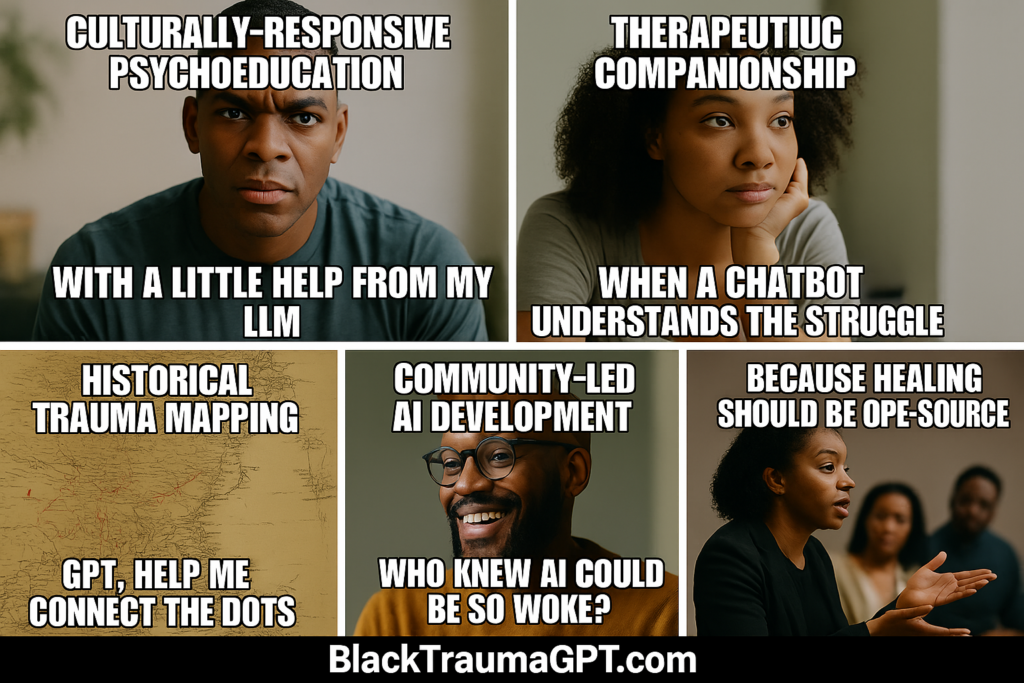
Progress and Hope for the Future
Dr. Matthews: It’s been about two years since we last spoke. How is your work, your truth, received by Nigerians? Is there some group or segment that’s waking up?
Victory: A lot of people are waking up. You don’t force change on people. Whatever seed you plant in their lives will germinate—it’s just a matter of time. This is something we’re doing gradually. To convince people and debunk falsehoods, we have to use truth because truth is the weapon against falsehood.
For instance, Nigeria’s economy is not the fault of any devil. It’s the government that’s responsible. When I tell people the truth, I allow reality to hit them. Once reality hits, their eyes will open to the truth I’ve been telling them. Reality is one of the best teachers right now.
When you tell people that if they’re sick, they should go to the hospital rather than relying solely on prayers, some might not believe you. But when they get sick and lose loved ones, they begin to see the truth. Some are already coming out to give testimonies about how they lost loved ones because they wasted time taking them to religious places for prayers instead of to the hospital.
Root Causes and Contributing Factors
Dr. Matthews: We’ve talked about religion as a trauma response and bad governance as a trauma response. What other factors are contributing to black trauma and racial trauma on the continent in Africa?
Victory: It’s ourselves.
Dr. Matthews: Wow, that’s heavy. Please elaborate.
Victory: We pressurize ourselves toward making money and achieving certain goals. While it’s good to push yourself to achieve goals, there’s unnecessary pressure we put on ourselves that can lead to depression. Non-contentment is another issue—people who are not content are always depressed because they’ll want what they don’t have. They look at what others have and want it, forgetting that as long as we’re in this life, we cannot have everything.
As long as there is life, we are bound to experience some challenges. Non-contentment will not give you satisfaction. Even when you achieve your aim, you’re still looking for something else. This can give you low self-esteem and pressurize you into depression, anxiety, and frustration. So ourselves is another factor that contributes to traumatization.
Mental Health in Africa
Dr. Matthews: Is there a mental health community in Africa, in Nigeria in particular? Are there psychologists and places where people can go to deal with their depression?
Victory: In my own side, there are such places, but people don’t take it that seriously. They don’t value it because religion has taken over everything. Everyone believes what they need is prayers, faith, scriptural guidance, and spiritual fathers or mothers to lay hands upon them.
People who might be passing through mental problems that need a psychologist or mental therapist to help them heal instead go to spiritual fathers—the pastors or religious leaders. These leaders act as therapists in many people’s lives. You see a religious leader who is not a certified therapist giving advice freely to people.
Religious leaders have taken over the jobs of most therapists because 70-90% of Africans are religious and believe that whatever happens to them has a spiritual cause. They believe the only healing they need is from a spiritual leader. Most of these religious leaders, especially those who are not educated, often end up adding more salt to injury, giving biased advice that escalates issues.
Future Outlook
Dr. Matthews: Africa needs you. I knew it was bad; I just didn’t know how bad. But do you see that it is getting better? Are you hopeful that at some point Africans will learn or relearn original spiritual systems?
Victory: We are gradually going back to our roots. I don’t think it will happen in this generation—it will probably be our next generation, our children. Whatever is inherited is very difficult to change; it takes gradual processes and time.
The focus should be on our children. Religion is still going to be very strong in Africa for a while, but we should plant seeds now and teach our children critical thinking because critical thinking is what will counter all these things. Truth is the most powerful weapon against falsehood, and critical thinking is also a weapon against falsehood. The more we engage in these discussions and teach our children to ask questions, the more they will understand. Instead of indoctrinating them in religion, we should raise them to become critical thinkers. That change will start with our next generation, not ours.
Victory’s Books and Work
Dr. Matthews: You’re doing the work through your publishing. How many books have you published now?
Victory: I’ve written more than ten books, including “Awakening the Giants in Africa,” “THE FALL AND BLINDFOLD OF Africa,” “A Puzzle Called Life,” “Be Shackled by Taboo,” “Why BEAT When You Don’t Want to Cry,” “Lamentations of a Alkebulan.”
Dr. Matthews: What are you working on now?
Victory: I’m working on “Racism and the Death of Democracy and the Rise of Injustice Somewhere in Africa.”
Closing Thoughts
Victory: Thank you for inviting me to this program. I love this topic because it’s very delicate. Whatever affects the mind of a person affects the person entirely, and trauma has a way of affecting people’s minds.
Using a computer analogy, trauma affects the mind like a virus affects a computer’s central processing unit. Whatever controls your mind controls you, and we manifest whatever is in our minds. Trauma is a parasite—just as a parasite feeds on its host, trauma feeds on the mind. It deforms your thoughts, reasoning, and productivity, and resists elimination.
Many Africans might not understand the importance of healing because we’re not always conscious of what we feed our minds. We easily forget or are ignorant of the fact that we manifest whatever is in our minds. So thank you for inviting me to talk about this delicate topic.
Victory Amarachi is the author of over ten books including “Awakening the Giants in Africa.” Her work focuses on empowering Africans to think critically about religion, governance, and personal development. To learn more about her books, visit the links in the description.
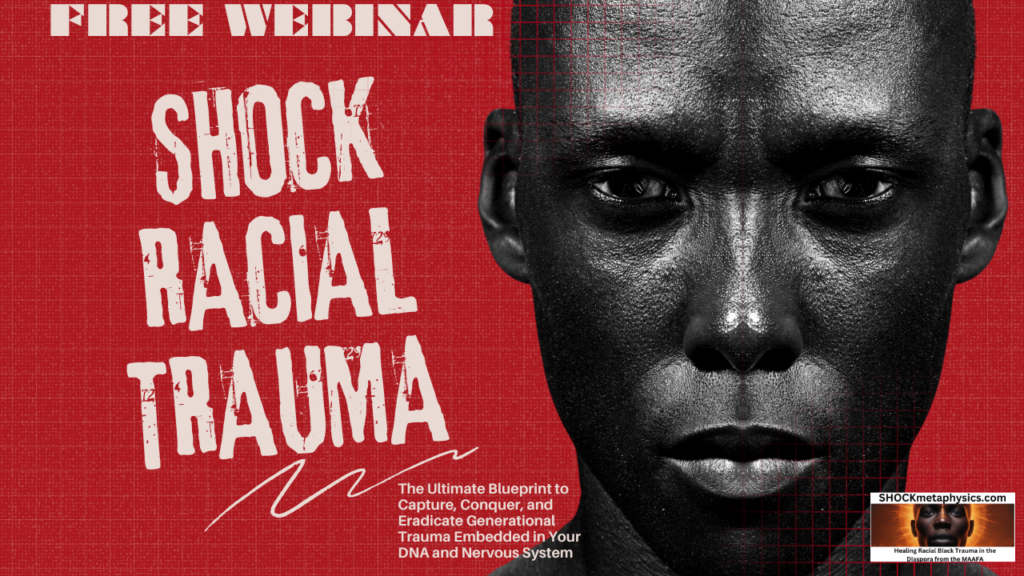
FREE SHOCK RACIAL TRAUMA WEBINAR: http://shocktraumafreewebinar.com
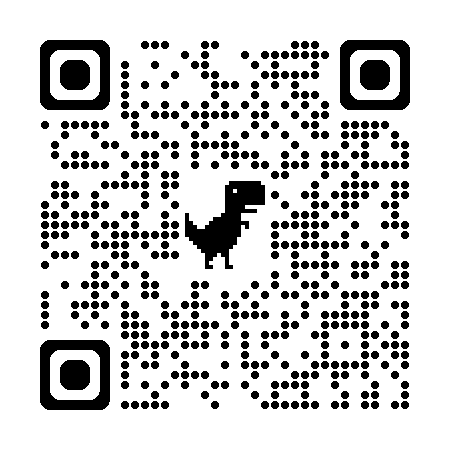
“I just completed a brief session with ChatGPT-Black Trauma. Wow! The responses I got were soooooo helpfu!.” — John Jackson (Patreon Member)
At BlackTraumaGPT.com, we aim to foster healing, understanding, and empowerment within Black communities by providing culturally sensitive education, insights, and mental health resources. We aim to deepen the collective awareness of Black trauma’s historical roots and its contemporary manifestations while guiding individuals and communities toward paths of self-care, resilience, and holistic healing. By leveraging the wisdom of Africana phenomenology and the expertise of Black scholars, we support the transformation of trauma into strength, encouraging collective growth and thriving.
IT’S TIME TO BREAK BLACK TRAUMA! Heal Thyself @ BlackTraumaGPT.com http://blacktraumagpt.com/ ASK THE QUESTION(S)!
———————
Get Social with Doc SHOCK:
PATREON | ABOUT DR. SHOCK | FLY SOLO | ACADEMIC BIO | BLOG | BLACK TRAUMA PODCAST | ENDORSEMENT | THREADS | IG | FB PAGE | PRIVATE GROUP | X | LINKEDIN | TIKTOK | PINTEREST | BLACK TRAUMA GPT | BLACK AI CONSORTIUM | BOOKS BY DOC SHOCK
